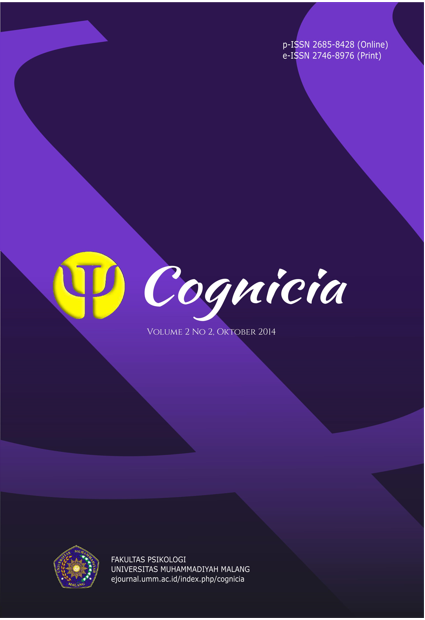STUDI PENGASUHAN ORANGTUA PADA ANAK AUTIS
DOI:
https://doi.org/10.22219/cognicia.v2i2.2014Abstract
Peran orangtua dalam mengasuh anak sangat penting, terutama bagi anak yang mengalami gangguan perkembangan seperti autis. Anak yang mengalami gangguan autis sulit untuk berkomunikasi dan bersosialisasi. Penelitian ini bertujuan untuk mengetahui pengasuhan orangtua pada anak autis yang melibatkan 20 pasang orangtua. Metode pada penelitian ini menggunakan metode kuantitatif deskriptif dimana pengambilan data menggunakan angket. Hasil penelitian menunjukkan bahwa 75% orangtua menerapkan pola pengasuhan demokratis, kemudian 15% menerapkan pola pengasuhan otoriter, dan 10% orangtua menerapkan pola pengasuhan permisif. Adapun dampak yang dapat dikemukakan pada penelitian ini adalah pada pola asuh demokratis orangtua lebih memahami keinginan dan minat anak. Sehingga perlakuan orangtua didasarkan pada kepentingan anak bukan hanya kepentingan orangtua. Pada pola asuh demokratis menunjukkan bahwa anak lebih mudah diajak berkomunikasi, emosional anak lebih stabil dan tenang. Kemudian pada pola asuh otoriter orangtua lebih mementingkan keinginan dan kepentingannya tanpa memikirkan kepentingan anak, sehingga anak pada pola asuh ini menjadi lebih pendiam dan kurang bisa mengeksplor kemampuannya dalam hal komunikasi dan sosialisasinya. Sedangkan pada pola asuh permisif, orangtua cenderung mengabaikan kepentingan dan keinginan anak dan cenderung menyerahkannya kepada orang lain. Anak pada pola asuh ini cenderung menunjukkan perilaku agresif.
Katakunci: Pengasuhan orangtua, autis
The role of parents in raising children is very important, especially for children with developmental disorders such as autism. Where children with autistic disorder is difficult to communicate and socialize. This study aims to determine the parenting autistic children involving 20 sets of parents. Method in this study uses descriptive quantitative method in which data collection using questionnaires. The results showed that 75% of parents applying democratic parenting, then 15% applying authoritarian parenting, and 10% of parents applying permissive parenting. As for the impact that could be addressed in this study is that the children in the democratic parenting parents better understand the desires and interests of children. So that treatment is based on parental interest is not only the interests of the child parents. Later on authoritarian parenting parents more concerned with the wishes and interests without considering the interests and wishes of children. While the permissive parenting, parents tend to ignore the interests and wishes of children and hand them over to someone else.
Keywords: Parenting, autism
Downloads
Downloads
Published
How to Cite
Issue
Section
License
Copyright (c) 1970 Mufadhilah Mufadhilah

This work is licensed under a Creative Commons Attribution-ShareAlike 4.0 International License.
Authors who publish with Jurnal Cognicia agree to the following terms:
- For all articles published in Jurnal Cognicia, copyright is retained by the authors. Authors give permission to the publisher to announce the work with conditions. When the manuscript is accepted for publication, the authors agree to automatic transfer of the publishing right to the publisher.
- Authors retain copyright and grant the journal right of first publication with the work simultaneously licensed under a Creative Commons Attribution-ShareAlike 4.0 International License that allows others to share the work with an acknowledgment of the work's authorship and initial publication in this journal.
- Authors are able to enter into separate, additional contractual arrangements for the non-exclusive distribution of the journal's published version of the work (e.g., post it to an institutional repository or publish it in a book), with an acknowledgment of its initial publication in this journal.
- Authors are permitted and encouraged to post their work online (e.g., in institutional repositories or on their website) prior to and during the submission process, as it can lead to productive exchanges, as well as earlier and greater citation of published wor (See The Effect of Open Access).

This work is licensed under a Creative Commons Attribution-ShareAlike 4.0 International License







